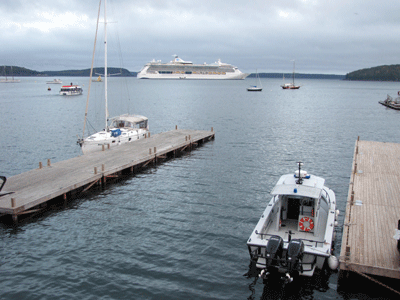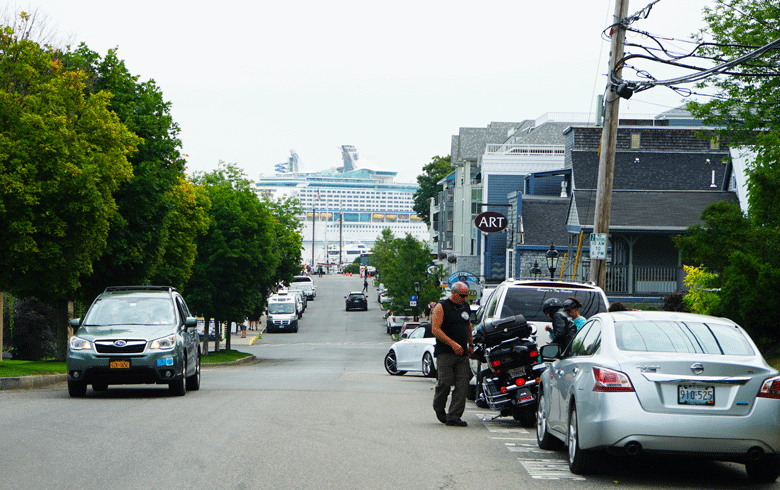Masses of cruise ship passengers coming into Bar Harbor from April through November bring a pretty good chunk of change for owners of local shops.
Although no one really knows how many folks come off the ships in any given day, it could theoretically be 5,500, since that’s been the town’s passenger cap.
“The ships account for 25%-30% of my revenue in the average year,” Robin Wright, owner of three downtown shops, wrote in comments reviewed by the town council this summer.
Ron Wrobel, owner of a small coffee shop called Acadia Perk, wrote that this year, with the return of cruise ships, the business was up nearly 40 percent year-to-date.
So why is Bar Harbor getting set to restrict ship arrivals with lower daily caps along with monthly caps and a shorter season? It’s an effort to relieve what many residents say is simply too many people coming all at once.
Like ports the world over in 2020, Bar Harbor experienced its first season in decades without the presence of cruise ships.
Like ports the world over in 2020, Bar Harbor experienced its first season in decades without the presence of cruise ships.
In subsequent months, as residents contemplated the industry’s inevitable resumption, a groundswell of comment rolled out from residents interested in cutting back ship traffic, at least to some degree.
Now the town has two initiatives underway to address those interests.
At a special town meeting on Nov. 8, voters will decide whether to adopt an amendment to the land use ordinance, brought to the town via a citizen petition, that would limit the number of people disembarking from cruise ships to an aggregate of 1,000 per day. A public hearing is scheduled for Oct. 18, after this issue of The Working Waterfront is printed.

In July, petition organizer Charles Sidman told the council the proposal was driven by the sense among signatories that the town has been “overrun” by cruise ship traffic.
Separately, the town council recently passed a plan to remove April and November from the season, cut the daily cap to 3,800 in four of the remaining months and to 3,500 in the other two months, and impose monthly caps of 30,000 in May and June, 40,000 in July and August, and 65,000 in September and October.
The plan was worked out through negotiations with the cruise ship industry after consulting with a maritime attorney, said Town Manager Kevin Sutherland.
The plan will become effective in 2023 but will honor bookings made under the 5,500-passenger cap. Ships under 200 passengers are exempted. The proposal calls for developing memoranda of agreement with each shipping line that visits Bar Harbor, reviewing the caps each season, and working with state and federal governments to increase the number of ports of entry in Maine to spread demand.
Bar Harbor has been booking over 150 ships in recent years, many carrying several thousand passengers.
At one time, the community was looking to promote Bar Harbor as a port of call. Today, it’s Maine’s largest cruise ship port, tying in with Acadia National Park as a marquee destination. It’s also a logical customs check and port of entry for ships coming from Canada, according to a report by the group that developed the town plan.
Although cruise ships have grown larger in recent years, their absolute size isn’t the only factor in determining the industry’s impact, the report noted. For example, packages for a 500-passenger ship included a bus tour of Acadia, requiring 10 buses. But a recent visit by a 2,300-passenger ship made the park tour an add-on—ultimately calling for only two buses.
Residents come at the topic from various angles. Some say the industry causes congestion on the waterfront, impedes the waterfront viewshed, and pollutes the water and air with sewage and smoke.
Others say passengers are a small segment of overall tourism, yet provide significant revenue.
If the citizen amendment passes in November, it would supersede the town plan.
But questions have been raised about the amendment’s legality.
The citizen initiative “is a guaranteed lawsuit tying us up in litigation for years” Gary Friedmann, a town councilor, said in August.
If that happens, he continued, the town’s plan would at least go ahead with a level of reduction.
“The best thing is it has us in real communication and constructive dialogue with the cruise lines themselves,” Friedmann said. “And if we can continue to have a downward trajectory, that’s Bar Harbor’s goal.”





